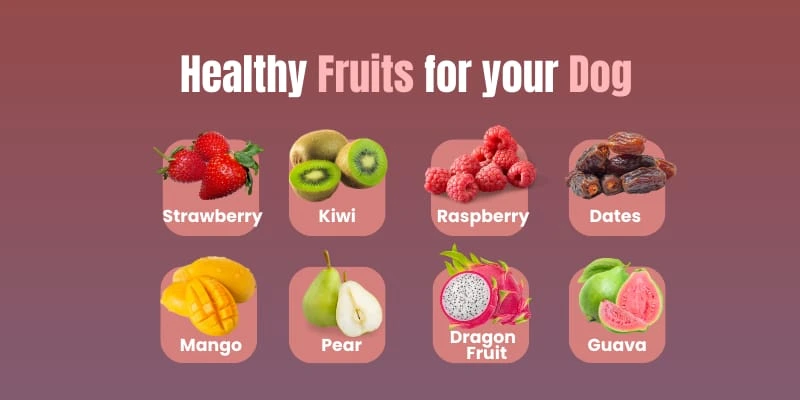What Fruits Can Dogs Eat? A Guide to Safe Snacks
Published: 4 Nov 2024
Hello!
Can dogs eat fruits? It’s a question that confuses many dog owners. While some fruits provide vital vitamins and hydration, others can be harmful. So, how do you figure out what fruits can dogs eat?
This guide will clear up the confusion and help you make informed choices. We’ll break down the safest fruits dogs can eat, their nutritional content, and their health benefits. We will also discover water-rich, vitamin-rich, antioxidant-rich, fiber-rich, and low-calorie fruits so that you can select the perfect treat for your dog.
Let’s dive into the details so you can confidently give your dog the fruits they’ll love!
What Are the Safe Fruits for Dogs?
Fruits are the healthiest and most nutritious foods, offering several health benefits. But we need to be mindful of what’s safe and what’s not.
Here’s a list of fruits that dogs can eat without any worries:
- Apple
- Apricot
- Banana
- Blackberry
- Blueberry
- Cranberries
- Cantaloupe
- Coconut
- Date
- Dragon Fruit
- Fig
- Guava
- Honeydew Melon
- Kiwi
- Mango
- Mulberry
- Nectarine
- Papaya
- Passion Fruit
- Peach
- Pear
- Pineapple
- Plum
- Pomegranate
- Raspberry
- Strawberry
- Tangerine
- Watermelon

When it comes to feeding your dog fruits, knowing how each one can benefit them nutritionally is essential. That’s why we have categorised these fruits based on the vital nutrients they provide, such as
- Hydrating Fruits
- Fruits rich in Fibers
- Fruits Rich in Antioxidant
- Fruits rich in vitamins
This way, it’s easier to see which fruits are best for boosting your dog’s immune system, supporting digestion, or keeping their coat shiny and healthy.
Let’s dive into each category and explore the specific benefits of these fruits!
Hydrating Fruits
Did you know that dogs can experience dehydration just like humans, especially during hot weather or intense activity?
Hydrating fruits are nature’s way of keeping your dog hydrated, refreshed and energized. Packed with high water content, these fruits do more than just quench thirst—they replenish lost fluids, support healthy digestion, and provide vital nutrients that keep dogs feeling their best.
Whether it’s a summer day or post-workout snack, or a refreshing treat for your furry friend, hydrating fruits are the perfect solution. Let’s explore some hydrating fruits, their unique benefits, and their nutritional profiles:
| Fruit | Water Content (%) | Calories (per cup) | Key Nutrients | Unique Benefits |
|---|---|---|---|---|
| Cantaloupe | 90 | 54 | Vitamin A, C, potassium, magnesium, fibre | Improves vision and skin health |
| Coconut | 95 | 45 | Coconut water, manganese, calcium, magnesium, antioxidants | Replenishes electrolytes |
| Honeydew Melon | 90 | 61 | Vitamin C, A, potassium, fibre | Supports skin health and improves digestion |
| Watermelon | 92 | 46 | Vitamins A, C, potassium, lycopene, fibre | Reduces inflammation and supports heart health |
Fiber-Rich Fruits
Studies have shown that digestive issues in dogs, often caused by low fibre intake, can lead to discomfort and health complications. Fiber-rich fruits are a natural powerhouse for a healthy digestive system. Packed with dietary fiber, these fruits not only support smooth bowel movements but also help regulate blood sugar, promote heart health, and keep your dog feeling satisfied longer.
Let’s uncover the top fiber-rich fruits and their incredible benefits!
| Fruit | Fiber Content (g) | Calories (per cup) | Key Nutrients | Unique Benefits |
|---|---|---|---|---|
| Apple | 4.4 | 95 | Vitamin C, potassium, antioxidants | Supports dental health by cleaning teeth |
| Apricot | 3.1 | 48 | Vitamin A, C, potassium, iron, fiber | Promotes healthy vision with beta-carotene |
| Banana | 3.1 | 105 | Vitamin B6, potassium, manganese | Regulates bowel movements |
| Date | 6.7 | 66 | Magnesium, potassium, iron, antioxidants | Provides an energy boost with natural sugars |
| Fig | 2.9 | 47 | Calcium, magnesium, potassium | Strengthens bones |
| Guava | 5.4 | 112 | Vitamin C, A, fibre, potassium | Enhances immunity and skin health |
| Nectarine | 2.6 | 63 | Vitamin C, potassium, antioxidants | Detoxifies the body |
| Pear | 5.5 | 101 | Vitamin C, K, fibre, antioxidants | Regulates blood sugar levels |
| Plum | 2.5 | 46 | Vitamin C, K, antioxidants, potassium | Supports heart health |
Vitamin-Rich Fruits
Vitamin deficiencies in dogs can weaken their immune system and increase the risk of diseases. Adding vitamin-rich fruits to their diet helps prevent these issues.
These fruits provide a powerful dose of goodness, offering vitamins like C for immune support, A for eye health, and E for glowing skin. Studies show that dogs consuming fruits high in vitamins enjoy better cognitive function and reduced inflammation.
Ready to explore the world of vitamin-rich fruits and their benefits for you and your furry friend? Let’s dig in!
| Fruit | Calories (per cup) | Key Nutrients | Unique Benefits |
|---|---|---|---|
| Papaya | 59 | Vitamin C, carotenoids, folate, potassium | Reduces bloating and aids digestion with papain |
| Passion Fruit | 100 | Vitamin A, C, antioxidants, iron | Relieves anxiety |
| Pineapple | 83 | Vitamin C, manganese, bromelain | Reduces inflammation and improves digestion |

Antioxidant-Rich Fruits
Antioxidants are like tiny powerhouses of health. They are packed with compounds like anthocyanins, flavonoids, proanthocyanidins, betalains, carotenoids, resveratrol, punicalagin, ellagic acid, and quercetin that fight harmful free radicals and reduce the risk of chronic diseases and even promote a longer, healthier life.
Let’s explore the top antioxidant-rich fruits and their unique benefits they offer to your furry friend.
| Fruit | Calories (per cup) | Key Nutrients | Unique Benefits |
|---|---|---|---|
| Blackberry | 62 | Vitamin C, K, anthocyanins, manganese | Supports heart health and skin health |
| Blueberry | 84 | Vitamin C, K, flavonoids, manganese | Improves brain function and memory |
| Cranberry | 46 | Vitamin C, proanthocyanidins | Prevents urinary tract infections |
| Dragon Fruit | 60 | Vitamin C, betalains, magnesium | Improves gut health with prebiotics |
| Kiwi | 42 | Vitamin C, E, polyphenols, potassium | Boosts immune health and improves skin health |
| Mango | 107 | Vitamin A, C, carotenoids | Enhances retina function |
| Mulberry | 61 | Vitamin C, K,resveratrol, iron | Supports red blood cell production |
| Pomegranate | 72 | Vitamin C, punicalagin, potassium | Improves heart health |
| Raspberry | 64 | Vitamin C, antioxidants ellagic acid, manganese | Reduces inflammation and supports skin health |
| Strawberry | 49 | Vitamin C, antioxidants quercetin, manganese | Brightens teeth naturally with malic acid |
| Tangerine | 53 | Vitamin C, antioxidants, flavonoids, potassium | Supports respiratory health |
You can also use our calculator to find the perfect calorie intake tailored to your dog’s needs.
How to Introduce a New Fruit to a Dog?
Feeding fruits to your dog can be a healthy addition to their diet, but it’s important to take certain precautions to ensure their safety and well-being.
- Always wash fruits thoroughly to remove any pesticides or chemicals that may be harmful to your dog.
- Remove any seeds, pits, or stems before offering fruits to your dog. These parts can be harmful or pose choking hazards.
- Make sure the fruit is safe for dogs. Some fruits, like grapes and avocados, are toxic. Always check before offering anything new.
- Begin with a tiny piece of the fruit. This will help you monitor your dog’s reaction. Dogs can have sensitive stomachs, so introducing too much at once may cause upset stomachs.
- Watch your dog for any signs of allergies after eating fruit. If your dog vomits or has diarrhoea, stop feeding the fruit immediately and consult your vet if needed.
- Even safe fruits should be given in small amounts. Fruits contain natural sugars, and consuming too much can lead to weight gain or stomach upset.
By following these steps, you can help ensure that your dog enjoys a safe and healthy snack.
Which Fruits Are Perfect For Diabetic Dogs?
Diabetes in dogs requires careful diet management, including the fruits they consume. For diabetic dogs, it’s essential to choose fruits with a low glycemic index and high fibre to help regulate blood sugar levels.
Here’s a list of perfect fruits for diabetic dogs:
- Blueberries
- Strawberries
- Raspberries
- Watermelon
- Cantaloupe
- Peaches
- Pumpkin
- Apples
When served in moderation and without added sugars, these fruits can be safe and nutritious options for diabetic dogs. However, always consult your veterinarian before introducing new foods to ensure they meet your dog’s dietary needs.
Conclusion
So, guys, it’s time to wrap up. In this article, we’ve covered what fruits can dogs eat in detail.
From my experience, sweet fruits like strawberries and pears can be a fantastic addition to your dog’s snack rotation, offering both flavor and health benefits. Just remember to introduce them gradually and monitor how your dog reacts.
If you learned something new today, don’t hesitate to share this article with your friends and fellow dog lovers—let’s make sure our pets enjoy the best of what nature has to offer!
FAQs
Here are frequently asked questions about fruits dogs can eat!
Not all fruits are safe for dogs. While many fruits like apples and bananas are healthy, others like grapes and raisins can be toxic. Always check if a fruit is safe before giving it to your dog.
Yes, some fruits, including grapes, raisins, and avocados, can harm dogs. These fruits can cause serious health issues, so it’s best to avoid them entirely. Always research before adding a new fruit to your dog’s diet.
Fruits provide vitamins, minerals, and antioxidants that support your dog’s overall health. They can improve digestion, boost the immune system, and even help with hydration. Plus, they can be a tasty reward during training!
Yes, it’s important to remove any seeds and pits, as they can be choking hazards or toxic. For some fruits, like apples and pears, the skin is safe to eat. However, you should always wash fruits thoroughly to remove any pesticides.
Fruits like apples and watermelon are low in calories and high in fiber, making them great snacks for weight management. They can help your dog feel full without adding too many calories. Always pair fruit treats with regular exercise for the best results.

- Be Respectful
- Stay Relevant
- Stay Positive
- True Feedback
- Encourage Discussion
- Avoid Spamming
- No Fake News
- Don't Copy-Paste
- No Personal Attacks

- Be Respectful
- Stay Relevant
- Stay Positive
- True Feedback
- Encourage Discussion
- Avoid Spamming
- No Fake News
- Don't Copy-Paste
- No Personal Attacks





